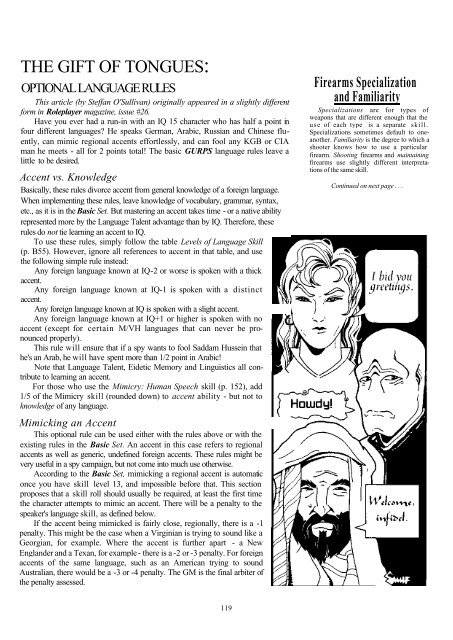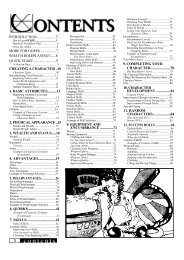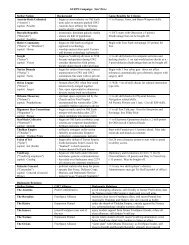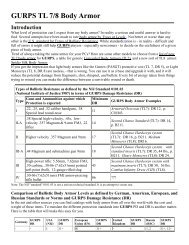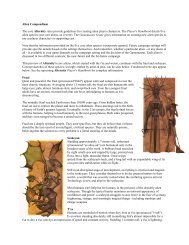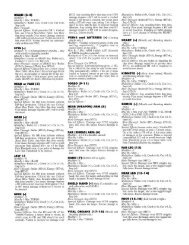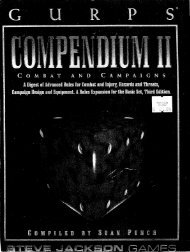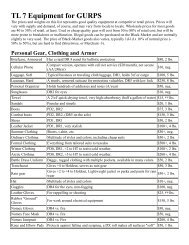GURPS - Compendium 1..
GURPS - Compendium 1..
GURPS - Compendium 1..
Create successful ePaper yourself
Turn your PDF publications into a flip-book with our unique Google optimized e-Paper software.
THE GIFT OF TONGUES:<br />
OPTIONAL LANGUAGE RULES<br />
This article (by Steffan O'Sullivan) originally appeared in a slightly different<br />
form in Roleplayer magazine, issue #26.<br />
Have you ever had a run-in with an IQ 15 character who has half a point in<br />
four different languages? He speaks German, Arabic, Russian and Chinese fluently,<br />
can mimic regional accents effortlessly, and can fool any KGB or CIA<br />
man he meets - all for 2 points total! The basic <strong>GURPS</strong> language rules leave a<br />
little to be desired.<br />
Accent vs. Knowledge<br />
Basically, these rules divorce accent from general knowledge of a foreign language.<br />
When implementing these rules, leave knowledge of vocabulary, grammar, syntax,<br />
etc., as it is in the Basic Set. But mastering an accent takes time - or a native ability<br />
represented more by the Language Talent advantage than by IQ. Therefore, these<br />
rules do not tie learning an accent to IQ.<br />
To use these rules, simply follow the table Levels of Language Skill<br />
(p. B55). However, ignore all references to accent in that table, and use<br />
the following simple rule instead:<br />
Any foreign language known at IQ-2 or worse is spoken with a thick<br />
accent.<br />
Any foreign language known at IQ-1 is spoken with a distinct<br />
accent.<br />
Any foreign language known at IQ is spoken with a slight accent.<br />
Any foreign language known at IQ+1 or higher is spoken with no<br />
accent (except for certain M/VH languages that can never be pronounced<br />
properly).<br />
This rule will ensure that if a spy wants to fool Saddam Hussein that<br />
he's an Arab, he will have spent more than 1/2 point in Arabic!<br />
Note that Language Talent, Eidetic Memory and Linguistics all contribute<br />
to learning an accent.<br />
For those who use the Mimicry: Human Speech skill (p. 152), add<br />
1/5 of the Mimicry skill (rounded down) to accent ability - but not to<br />
knowledge of any language.<br />
Mimicking an Accent<br />
This optional rule can be used either with the rules above or with the<br />
existing rules in the Basic Set. An accent in this case refers to regional<br />
accents as well as generic, undefined foreign accents. These rules might be<br />
very useful in a spy campaign, but not come into much use otherwise.<br />
According to the Basic Set, mimicking a regional accent is automatic<br />
once you have skill level 13, and impossible before that. This section<br />
proposes that a skill roll should usually be required, at least the first time<br />
the character attempts to mimic an accent. There will be a penalty to the<br />
speaker's language skill, as defined below.<br />
If the accent being mimicked is fairly close, regionally, there is a -1<br />
penalty. This might be the case when a Virginian is trying to sound like a<br />
Georgian, for example. Where the accent is further apart - a New<br />
Englander and a Texan, for example - there is a -2 or -3 penalty. For foreign<br />
accents of the same language, such as an American trying to sound<br />
Australian, there would be a -3 or -4 penalty. The GM is the final arbiter of<br />
the penalty assessed.<br />
Firearms Specialization<br />
and Familiarity<br />
Specializations are for types of<br />
weapons that are different enough that the<br />
use of each type is a separate skill.<br />
Specializations sometimes default to oneanother.<br />
Familiarity is the degree to which a<br />
shooter knows how to use a particular<br />
firearm. Shooting firearms and maintaining<br />
firearms use slightly different interpretations<br />
of the same skill.<br />
Continued on next page . . .<br />
119


